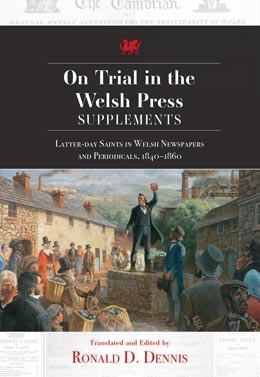Chronicle of the Religious Societies
1852 January, p. 27—Paragraph about splinter groups from Mormons
1853 January, p. 18–19—Deceit of Mormonism T. Hughes—Ruthin Town Hall
Chronicle of the Religious Societies, January 1852, p. 27
https://
The Mormons
Although they call themselves “Latter-day Saints,” they have already divided into seven sects—Brighamites, Strangites, Hydeites, Cutlerites, Brewsterites, Bishopites, and Rigdonites; and these denominations are very fervent in their zeal against one another. One would expect: “Latter-day Saints”—saints of the miraculous gifts—saints of inspiration directly from heaven—saints who have put so much blame on the divisions of the other denominations—the saints were to be one brotherhood; thus, one would expect them to be more unified. These saints in many places have received much scorn and persecution. No one should be persecuted while they allow fair play to other people. If there is anyone in any place who wishes to become one of the Mormons, first let him sit down pensively and honestly to examine their history, and to study their principles; and then if he is convinced that they are sincere “Saints,” and that they have the miraculous gifts, and that they alone are the “one true church,” let him then profess Mormonism in a dignified and unassuming spirit.
Chronicle of the Religious Societies, January 1853, pp. 18–19
https://
The Deceit of Mormonism,
By T. Hughes (T. ab Gwilym). Rhuthun: printed by I. Clarke.
The first lecture has been presented and printed, including a revelation of the deceit of the beginning of Mormonism; there are five more to follow. My personal knowledge of the “Latter-day Saints” does not extend any further than North Wales. And what I have heard with my ears, and seen with my eyes, leads me to pity them rather than fear them—to pray for them rather than waste arguments on them. I knew a lad who had not entirely learned how to curb his appetites, but who felt at times a desire to become a public man, such as a preacher or a missionary: and since the Lord’s people did not encourage him to practice his gift, he decided to undertake the task without encouragement. About midnight, pretending to sleep in his bed, he would hold a service by praying, singing and preaching. Hundreds flocked from far and near to listen to him. Some of them supposed that heavenly angels had come to dwell in his tent, and that there was a strange miracle before their eyes. Others blushed, and sweated to see the false religion of their countrymen. After his scheme failed, the man turned out as ungodly as fairground cursers could be. But the religious thrills returned. He joined the “saints,” and he was made a preacher among them. I heard that on the Sabbath he argued for the immortality of not only the soul, but of the body of every Mormon; and that he soon afterwards went down to the coal mine, and was burned until he was like a piece of coal; that then, although they saw his body burned to cinders, his fellow-saints swore he was still alive! I hope he was saved. I never thought he was as responsible as men in general. And the physiognomy, and phrenology, and screams, and assertions, and contradictions of the few “saints” I have heard speaking in North Wales, make me feel exactly the same way towards them. And the danger is that attention will be drawn to them by bickering with them. I imagine one could obtain facts to prove that this is where the danger lies. It is extending the life of self-destructive madness to speak against it. And about such things I have considerable faith in the advice of a certain Pharisee called Gamaliel, who said, “Refrain from these men, and let them alone.”
But there is nothing clearer than the fact that Joe Smith in America intended to play Mahomet as his brother had done in Asia. The disorderly Mormon system is made up of Atheism, Mahometanism, Papism, and a pretense of Christianity. Its success has been quite extensive. In January 1851, it had 12 high priests, 1,761 elders, 1,590 priests, 1,226 teachers, and 682 deacons. They baptized in England in 14 years 50,000! and there were thousands of Welsh people among them! 17,000 have emigrated to the American Zion! These figures are taken from the Saints’ statistics. Mormonism in America has had some able and skillful defenders, such as Orson Pratt, etc., but our honest opinion is, that they were paid servants selling their gift for money, and not seekers for the truth. The skill of their defense, and the madness of the principles they uphold, are completely irreconcilable on any other grounds. But since an opponent to them has risen up in North Wales, I am very glad that he is one of the masters of the congregation of rational thinkers—one who can examine the disorderly system from its beginning, and discuss it thoroughly—one who could argue with a devil without behaving rudely, or bringing a judgment of calumny on himself—and one who will not mock his opponent and will not allow his opponent to mock him.
J. R.
